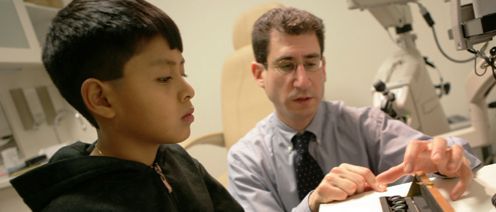
Pediatric ophthalmologists undergo additional training in order to treat the eyes and developing visual system of infants and children. In addition, these physicians often treat adult strabismus, as the instruction of surgical treatment techniques for strabismus is typically combined with pediatric ophthalmology fellowship.
Weill Cornell Medicine ophthalmologists offer comprehensive vision services for both pediatric patients and adults with strabismus. Some conditions, including amblyopia, are diagnosed and treated exclusively by pediatric ophthalmologists; others require a team approach with input from orthoptists, optometrists and other specialists. Our ophthalmologists maintain close relations with pediatric neurologists, neuroradiologists, otolaryngologists and neonatologists, enabling unparalleled continuity of care for our patients. Child-friendly physicians and staff, as well as state-of-the-art facilities, diagnostic equipment and surgical techniques, support our mission to provide excellent care for you and your child.
Common pediatric eye problems we screen and provide treatment for include:
- Amblyopia (lazy eye).
- Lacrimal duct obstruction (blocked tear ducts).
- Cataracts.
- Nystagmus (shaking eyes).
- Ptosis (droopy eyelids).
- Congenital malformation of the eye.
- Congenital optic nerve problems.
- Strabismus (crossed or wandering eyes).
For information regarding any of the conditions above, refer to the American Academy of Ophthalmology Eye Health Library.
Pediatric Ophthalmology Patients
Healthy children without any known eye disease risk factors should undergo age-appropriate screening examinations with their pediatricians and schools, and may be referred to an ophthalmologist as needed.
Children with parents or siblings with certain eye conditions, including strabismus or amblyopia, may be at increased risk for these problems, even if they do not appear to have any difficulty with their eyes or vision. These children would benefit from assessment with a pediatric ophthalmologist.
Children with certain medical conditions, including diabetes, blood problems, metabolic problems and genetic diseases such as neurofibromatosis, need to be examined regularly for eye problems.
Some serious eye problems present warning signs early in life. Poor vision, eye pain, changes in the shape or size of an eye, crossed or wandering eyes and abnormal pupil appearance in one or both eyes may be signs of serious eye conditions that should be evaluated by a physician.
Pediatric Eye Examination
We can learn a great deal about a child's eyes from examination, even when the child is too young to read a wall chart. All eye examinations include an assessment of visual function and an inspection of the eyes with a hand-held light or microscope. During your initial visit at Weill Cornell Medicine, even if your child has been seen by another eye doctor previously, they will have their pupils dilated. As with an adult eye examination, dilating drops require 30 minutes to take effect, and will blur your child's vision to a mild degree for several hours.
Related Physicians

- Assistant Professor, Assistant Attending Ophthalmologist

